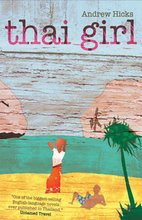
Why do we farang so love swimming?
The Debate Rages On!
A few weeks back, Jerry the Farang read the draft of my new book, ‘MY THAI GIRL AND I’ and he told me I moaned too much. So I posted a chapter of it on this blog (scroll down a couple of posts) and asked for your comments. Most of you have responded that the chapter’s okay and so should be included in the book, but I’m still worried it may come across as an unmitigated rant. So I’ve decided to delete it.
Jerry has now posted a new Comment that appears as follows and my thoughts appear below it.
Jerry the Farang has left a new comment on your post "Is It I Who Am The Buffalo?":
Andrew...
I fear you missed my point. It wasn't just the chapter about the jeep. (In fact, buying a 30-year-old vehicle would've been a mistake in the UK.) It wasn't a matter of balance missing in the one chapter, there was no balance in the book; it's one long complaint. Even when you find something you like---people making financial contributions upon arriving at a party you are hosting, for example---you don't look good, in this instance coming off as a Cheap Charlie.
In his introduction to WANDERLUST, an anthology of stories from salon.com, Pico Iyer writes, "Though it's fashionable nowadays to draw a distinction between the 'tourist' and the 'traveler', perhaps the real distinction lies between those who leave their assumptions at home, and those who don't. Among those who don't, a tourist is just someone who complains. 'Nothing here is the way it is at home,'while a traveler is one who grumbles 'Everything here is the same as it is in Cairo'---or Cuzco or Kathmandu. It's all very much the same."
Your book is well written, you just sound like a tourist. My advice is to leave the manuscript as it is, once you get rid of or fix those repetitious and/or unrealized chapters in the last half.
Nothing seems to please you about Thailand and that's what bothers me. The point of view is valid, it just rubs me the wrong way. This is, after all, what you are: a complainer, along with all the other farangs who write letters to the editor.
Good to see you in Surin. Best, Jerry
Posted by Jerry the Farang to Thai Girl at 24 February 2008 23:08. My reply follows...
Thanks for that Jerry!
I like Pico Iyer as a writer very much but ironically he seeks to amuse with his outsider’s quips and bon mots and he too often comes over as tourist as much as traveler. In ‘Video Night In Kathmandu’, one of my favourite travel books (partly because I visited all the same places as him at much the same time), in the chapters on Thailand and the Philippines for example he hardly gets beyond the girlie bars.
I have taken your points fully on board and have changed the ending radically and will remove ‘Things Fall Apart’ as it’s not being balanced by a positive element, as is suggested by Lloyd in his Comment posted below. I do not imagine this will resolve the issue in your eyes though.
In writing the book I tried not to repeat the Gaugainesque cliché of a middle aged man escaping to a paradise of swaying palm trees and dusky maidens. I have described things in a subjective way just as they happened for me.
While it’s pretty easy to get used to an air conditioned condo in Bangkok, living full time in a Thai village and sharing the lives of a local family while working out new relationships isn’t and sometimes it can get to you. I now have nearly twenty years experience living in Asia and have spent several years in similar conditions in West Africa so am not exactly suffering culture shock.
While I thus describe those difficulties and frustrations, I have constantly tried to balance this by saying that I’m here and trying to deal with the difficulties precisely because I like it and because I want to be here. In your view I’ve not tried hard enough though!
Essentially I am exposing my own cultural assumptions and suggesting how they are at odds with and an impediment to appreciating amd enjoying the local style of life and learning something from it. In a number of chapters I say how differently my Thai family does this or that and that being in such close company with them without any break can be hard, but I then conclude that perhaps they’ve have found a better balance in their lives than mine.
I hope the book then goes on to describe my journey in challenging all my assumptions and as I put it, trying to let go and ‘learn to go with the flow’.
At one point I say as follows… ‘There are so many lessons here for me on finding a better balance in life and it’s still not too late for me to stop struggling and to go with the flow.’ Indeed the final words of the last chapter read, ‘It could be at last that I’m learning to go with the flow.’
In the chapter, ‘An Expat Expatiates’, I say that grumbling can be a useful safety valve when you’re living in a foreign culture but that moaning expats are a complete pain. I’ve tried to extract the humour from my predicament and at one point I say that if in the book I express my irritation at things, I’m not saying the Thais are irritating. It’s probably me being irritable. The joke is thus on me.
On your one specific comment about me looking a cheap Charlie over hosting the party to inaugurate our new house, this is the passage in the book you refer to…
“Why’s everyone walking off with plastic bags when they go home? As the folk arrive, a boy at a table checks them in and they make a small payment which he carefully enters in a book. The tradition is that when next time we go to their party, we consult our book and give them their stake back plus a modest mark-up. It’s a sort of rustic value added tax on parties and it seems a great idea. Everyone who pays gets unlimited food and alcohol for the duration and is given a takeaway present of food and cola in plastic bags.”
And I conclude, “The ceremony, the reason for the event and a good excuse for a beano of a party, is now over and I really enjoyed it, not that I understood very much of it…. The Buddhist faith looks fun and is so much an integral part of a small community such as this.”
How negative is that?
Incidentally I only otherwise mention money once in this chapter when I say that for anyone building a house there's no lawyer’s fees or stuff like that but never to forget the mega-party they’ll have to throw before they can live there. And that was supposed to be a joke!
You say, ‘Nothing seems to please you about Thailand.’ Jing jing??!!
In a way your comment is a relief to me as I thought I’d stuffed the book full of gushy, rose-tinted compliments about Thailand and I’m glad at least if I haven’t erred in that direction. There are even two chapter headings that refer to this as a ‘paradise’ and I could quote you many other gushy bits.
In one early chapter I describe precisely why I like and chose to live in Thailand (which I have known well for over thirty years) in preference to all the other countries I have visited in SE Asia. I debate these countries and then at some length spell out what I like so much about Thailand and why I’m living here. This is part of what I say…
“It’s a bit of a cliché but the principal reason has to be the special qualities of the Thai people themselves.” …
“It’s hard to pin down but the Thais have a dignity and a serenity that I love and foreign visitors, if not loud or aggressive, are accorded great consideration. Unlike in many countries, this unique welcome has survived several generations of mass tourism and has not been corrupted by familiarity.
Thailand is not just a superficial ‘Land of Smiles’ though and is more than an oriental parody of McDonalds’ politeness. It goes much deeper and as a very different culture to my own, I want to be here and to understand more of it. Yes, I like Thailand primarily for the Thai people themselves and because they never fail to make me feel at home.”
In an attemp to justify myself, the last chapter of the book now begins as follows…
“There has recently been a number of reality shows on TV where they’ve dumped some privileged urban Thais in Isaan to live with a farming family for a few weeks and they’ve been hilarious. The joke is that the Bangkokians found the whole experience unbelievably difficult and grumbled incessantly about everything.
I too have grumbled a bit between these pages and while I’ve tried hard to bring out the humourous side to my own predicament, I hope my quips and comments have not been unduly cynical or negative towards those around me. If I am to portray how it’s felt to live here though, as well as the good times it’s essential that I describe my frustrations too.
Nowhere is life perfect and it would be a cop-out for me merely to depict a rose tinted paradise of swaying palm trees and smiley Thais. What I have written therefore is not a detached and objective critique of life in Isaan but my personal account of how it happened to me, sometimes told in the heat of the moment with as much emotion as reason.
I’m therefore keeping my fingers firmly crossed that you now think I’ve found a balance that doesn’t gloss over my difficulties but also is fair to the place and the people who have received me so generously.”
I hope that the book now has a better balance since I’ve revised it and I’m grateful to you Jerry especially and to everyone else for this debate about it. Time will tell!
Andrew








